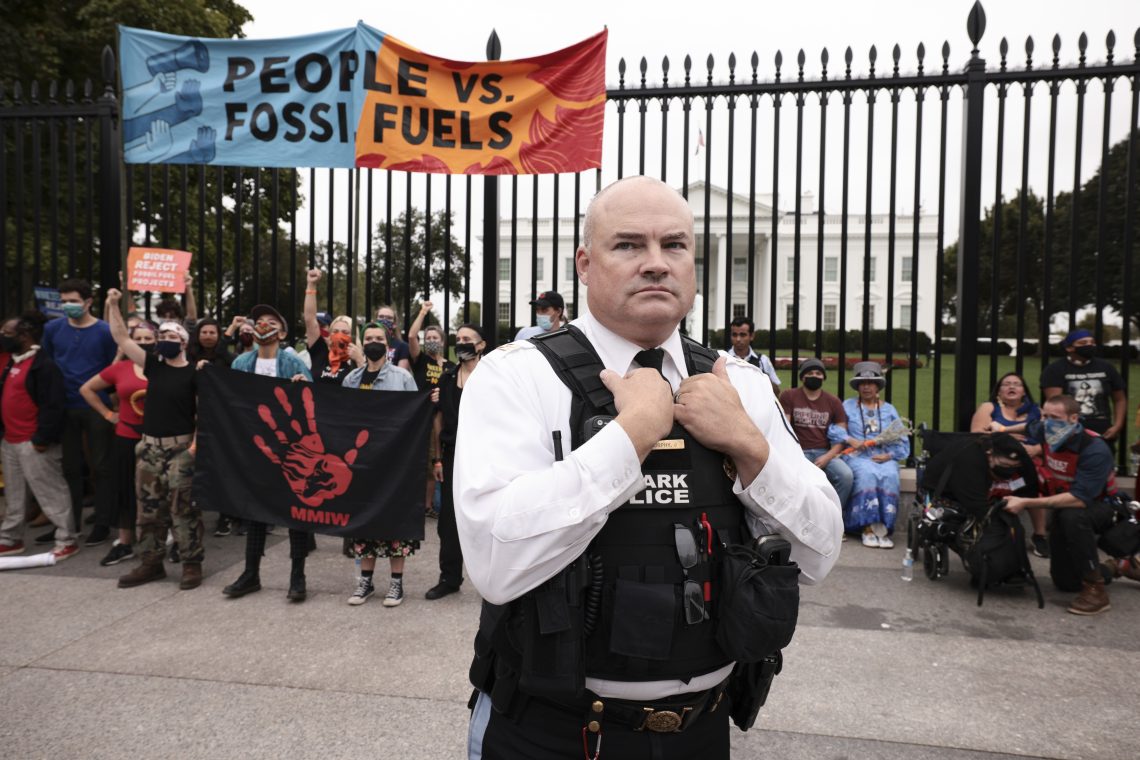The future of U.S. energy and climate policies
These two issues radically divide the American polity. Federal energy policies can be upended after the 2024 elections, but the states provide some continuity.

In a nutshell
- Republicans and Democrats are in opposing camps on climate
- When the party in power changes, U.S. energy policy is quickly reversed
- Another U-turn is possible in 2025
No domestic or foreign issue in the United States hinges more on the outcome of the next federal election in 2024 than the course of its energy and environmental policy. Without even knowing for sure who the candidates of the two principal American political parties will be, it is a given that they would bring diametrically opposed policies to the Oval Office.
Regardless of the composition of the House of Representatives and the Senate after the 2024 race, the party aligned with the White House, be it the Republicans or the Democrats, will use the power of the presidency to press its energy and climate agenda.
Doubts about climate science
Less than a decade ago, growing confidence in climate science, an activist “climate agenda” and the imperative of aggressively addressing climate change all seemed irreversible. Even the presidency of Donald Trump (2017-2021) and his forceful promotion of fossil fuel extraction and exports did little to stem the enthusiasm for the climate-focused policies.
Conversely, with the inauguration of President Joe Biden in 2021, the new administration made climate policy a focal point of both its domestic and foreign policy. In one of Mr. Biden’s very first acts in office, he reversed President Trump’s withdrawal from the Paris Agreement (also known as Paris Climate Accords), a strong signal of new priorities in the White House that later materialized in a host of legislative initiatives. Domestically, those have included the Inflation Reduction Act of 2022. In foreign policy, there has been an emphasis on “green projects” as a priority for energy-related foreign assistance.
The sobering experiences from the Covid-19 pandemic emboldened many people to question what is presented to them as science-based.
Over the course of Mr. Biden’s term, however, several factors have contributed to questioning climate orthodoxy, potentially making energy and environmental issues among the most divisive items in the U.S. politics.
Without question, Russia’s full-scale invasion of Ukraine prompted concerns over climate policies that emphasized dramatic reductions in greenhouse gases and accelerated government-mandated adoption of renewable energy sources (wind and solar) and “clean” technologies such as electrified transport systems. Rapid increases in energy prices in 2022 had a sobering effect on supporters of those policies. Americans watched as Europeans struggled with the fragility of economies dependent on external energy sources. The drama caused many Americans to wake up to the challenge of ensuring reliable, affordable and abundant energy while implementing climate policies.

The earlier, sobering experiences from the Covid-19 pandemic emboldened many people to question what is presented to them as science-based. Some of the restrictive and damaging policies allegedly buttressed by consensus in the medical community proved controversial – in some cases, flat wrong. (For example, much-emphasized hand washing and cleaning surfaces turned out to be of little relevance to Covid-19 virus transmission.)
Rad more on climate policy
Climate illusions are no substitute for disaster management
Climate, science and the dangers of ‘no alternative’
This issue was exacerbated by mainstream and social media, which sought to moderate discussions over medical aspects of responses to the pandemic. That fueled controversy and distrust. The debate over what constitutes established science was not restricted to the pandemic. The scary claims of climate science also meet with more skepticism. For instance, the 2019 report of the UN Intergovernmental Panel on Climate Change found “no strong evidence of century-scale increasing trends in U.S. landfalling hurricanes or major hurricanes.”
Not ready to upend the economy
Costs and practicality are other essential factors in the debate. Reaching the goal of “net zero” greenhouse gas emissions by 2050 requires dramatic restructuring of the economy and significant costs. As post-Covid-19 economies have experienced heavy debt loads, slow growth and higher taxes, support for climate policies has dwindled. Radical initiatives, like cutting nitrogen and ammonia emissions from agriculture (by reducing the use of fertilizers and shrinking livestock herds) precipitated agricultural protests and political crises from the Netherlands to New Zealand. These have also drawn the attention of many Americans.
Many in the West raise concerns about economic and security risks associated with dependence on Chinese-dominated green technology supply chains.
Supporters of climate policy admit that the cost of mitigating the effects of climate change continues to grow, but argue that, in the end, the green transition will create jobs and increase prosperity in addition to desirable environmental outcomes. The details of these arguments, however, are increasingly being challenged.
Read more on China and climate
Can the West and China work together on climate change?
Global competition is also a factor. China has a crucial role in international climate mitigation efforts, as the world’s third-largest emitter of greenhouse gases, the leading producer of green products (such as batteries and solar panels) and the holder of a near-monopoly in the rare earths required by clean energy technologies. The Biden administration has tried to adjust U.S. competition with China to still allow for cooperation on climate action. However, many Americans believe this policy is impractical.
Fears of change
Lately, despite experiencing extreme weather events, China has shifted its communication emphasis from climate change mitigation to national energy security. In addition to doubts about Beijing’s commitment to reaching declared climate goals, many in the West raise concerns about economic and security risks associated with dependence on Chinese-dominated green technology supply chains.
America’s partisan politics has also become an issue. In 2020, a poll showed Democrats as being three times more likely to prioritize climate change than Republicans. The two parties have since become even more divided on this matter. In August 2023, an NPR/PBS survey revealed that Democrats prioritized climate change by an astounding 90 percent to 10 percent margin, and almost three-quarters of Republicans (72 percent) prioritized the economy over climate issues. However, this year’s national poll also showed that American society as a whole continues to be reluctant to make sweeping changes to their lifestyle in order to cut carbon emissions. Clearly, no candidate for president in either party will get their party’s nomination if they stray from party orthodoxy on this issue.
Scenarios
Blue vs. Red policies
If a Democrat wins in 2024, there will be a continuation and acceleration of the present policies. These will include increased subsidies and tax breaks to accelerate the green transition, paired with skepticism toward additional drilling, refining and adding to pipeline capacity. On top of that, there will be a tightening of restrictions on activities such as farming, the design of appliances and new means of transportation. These restrictions could go as far as imposing limits on driving distance per month or banning gas-burning water heaters. In addition, U.S. foreign policy will continue making the climate agenda the top national priority, including in bilateral relations, U.S. commitments to the Paris Agreement and cooperation in international fora and agencies.
If a Republican wins, expect a second U.S. withdrawal from the Paris deal as one of the president’s first official acts. A Republican president will seek to roll back subsidies, tax breaks and special funding programs for the green transition while giving support for drilling, refinery expansion and pipeline construction. Climate policy will cease to be a U.S. diplomatic priority. Republicans will make establishing U.S. “energy dominance” (energy independence paired with robust exports) a strategic goal. A Republican president will emphasize energy security and economic growth over climate policy and will also seek to reverse the adoption of ESG (environmental, social and governance) policies at the federal and state levels and in the private sector.
Regardless of which party claims the White House, U.S. emissions will likely continue declining (with the adoption of new technologies and practices), but the country will never meet its “net zero” objectives. Electric vehicle ownership and use will likely continue to expand, albeit at different paces, whether by mandates or consumer choice. The U.S. nuclear industry, particularly the export market, will grow.
Most likely: Continued tug of war
Depending on the outcome of the elections, radically different federal domestic and foreign policies concerning energy and the environment will follow. That said, the “blue” states (controlled by Democratic governors and legislators) and the “red” states (controlled by Republican governors and legislators) will zealously attempt to stick to their preferred policies – regardless of what happens at the national level. Since the U.S. federated system gives states and local authorities significant sway over utilities, environmental laws and policies, manufacturing, energy use and production, expect the battle over climate policy to continue at the state and local levels.
For industry-specific scenarios and bespoke geopolitical intelligence, contact us and we will provide you with more information about our advisory services.









